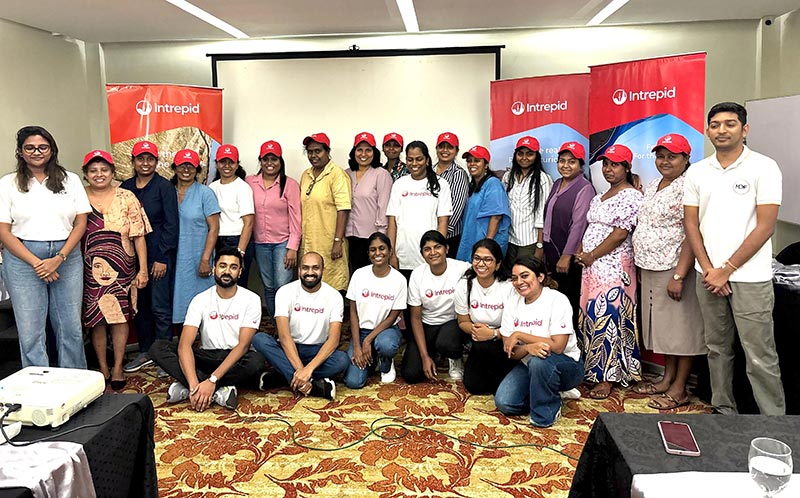Business
HNB partners with St. Joseph’s College Col. 10 Old Boys’ Union for exclusive affinity card

Reaffirming their commitment to supporting the nation’s prestigious educational institutions, Sri Lanka’s leading private sector bank HNB PLC recently announced their partnership with the Old Boys’ Union of St. Joseph’s College (SJC) Colombo -10 and its Ja-ela, Wattala branch to launch an exclusive affinity credit card for its members.
Custom-made for members of Old Boys’ Union of SJC, the customized Affinity card offers a wide range of exclusive benefits and promotional deals across the Bank’s broad portfolio of merchant partners.
Rector of St. Joseph’s College Rev. Fr. Ranjith Andradi, Priyanga Perera -Senior VP OBU SJC, Prithieraj de Silva – Immediate Past Senior VP, OBU SJC, HNB Managing Director / CEO Damith Pallewatte, HNB Chief Operating Officer- Sanjay Wijemanne , were present at the signing of the MoU at HNB head office
“St. Joseph’s College, Colombo stands as a pillar of educational excellence in Sri Lanka, nurturing generations of leaders who have shaped and continue to influence our nation’s trajectory across diverse sectors. Our partnership with the Old Boys’ Association represents more than just financial support; it’s an investment in Sri Lanka’s future. By collaborating on mentorship and skill-building initiatives, we’re actively contributing to the development of the next generation of visionary leaders. This alliance also aligns perfectly with our commitment to fostering sustainable growth and empowering communities, reflecting our broader vision of driving positive change in Sri Lanka’s educational landscape,” said HNB Managing Director / CEO Damith Pallewatte .
The partnership will offer members access to exclusive benefits across HNB’s extensive merchant partner network. Moreover, the bank will waive off the annual fee for the first year and provide members with a complementary supplementary card.
“The partnership between the Old Boys’ Union of St. Joseph’s College, Colombo -10 and HNB marks a significant milestone in our ongoing efforts to support and elevate our alma mater. This collaboration, particularly through the innovative affinity card program, goes beyond financial benefits; it’s a powerful tool for community building and institutional advancement.
By leveraging HNB’s financial expertise and our deep-rooted commitment to the college, we are not only supporting our current endeavors but also lays the groundwork for realizing the full potential of our students and institution. Together, we’re setting a new standard for how educational institutions and corporate entities can work hand in hand to nurture talent and drive societal progress,” said Senior VP Old Boys’ Union SJC, Priyanga Perera.
All members can use this opportunity to give back to school through this initiative, as a percentage will be contributed to the Old Boys’ Union of SJC every time a card is issued and used. Customers can also make use of a 12-month easy payment plans with 0% interest rates on all school fees payments to SJC, in addition to complementary overseas travel and health insurance plans.
Business
‘ComBank ends Q1 as first private sector banking group on the cusp of Rs 3 Tn. assets milestone’

The Commercial Bank of Ceylon Group has made a characteristically strong start to 2025, recording healthy profit and balance sheet growth in the first quarter of the year.
Comprising of Sri Lanka’s largest private sector bank, its subsidiaries and an associate, the Group reported in a filing with the Colombo Stock Exchange (CSE) that assets reached Rs 2.999 trillion as at 31st March 2025.
Gross income for the quarter grew by 9.85% to Rs 88.10 billion, while interest income improved by 3.14% to Rs 72.60 billion. Interest expenses reduced by 10.09% to Rs 38.38 billion as a result of repricing of liabilities amidst the lower rates regime that prevailed, generating a 23.53% growth in net interest income, which amounted to Rs 34.21 billion for the three months reviewed.
Total operating income grew by 33.40% to Rs 46.62 billion, but the Group’s provision for impairment charges and other losses was increased by 110.44% to Rs 7.23 billion with additional provisions made on a prudential basis for individually-significant customers, which resulted in an improvement in the Bank’s impaired loans (Stage 3) ratio.
Business
Intrepid in collaboration with MDF hosts an empowering workshop

Building on the momentum of its groundbreaking “Women in Tourism” initiative, Intrepid Travel Colombo, in collaboration with the Market Development Facility (MDF) and the Sri Lanka Tourism Development Authority (SLTDA), successfully conducted another impactful workshop—this time focusing on women business owners in the tourism sector.
Held in Kandy on Saturday, 5th April, the session brought together 15 dynamic female business owners from the Central Province with a shared passion for responsible tourism and sustainable business. The workshop forms part of Intrepid’s ongoing commitment to advancing gender equality and empowering women across the tourism value chain in Sri Lanka and follows the inaugural training program held in September last year which targeted aspiring female tour leaders.
This insightful session was tailored to uplift and support women who are already leading or managing businesses within the tourism ecosystem, and hailing from the Central Province.
“This was an impactful day of learning, sharing, and growing together,” said Poornaka Delpachitra, Country GM of Intrepid. “Our focus this time was on women business owners—those who are already shaping Sri Lanka’s tourism industry in meaningful ways but often face unique challenges in accessing resources, networks, and recognition. By creating a space for peer connection, leadership development, and shared learning, we’re investing in a stronger, more inclusive tourism sector.”
The training session was designed to strengthen key leadership and entrepreneurial skills such as business strategy, confidence-building, marketing, and innovation in sustainable tourism. It also provided participants with valuable networking opportunities and a sense of solidarity, reinforcing the message that women are not alone in their journeys.
Business
Kushan Samararatne takes the helm at Colombo Coffee Company

Colombo Coffee Company, the largest total coffee solutions provider in Sri Lanka’s and a fully-owned subsidiary of the world’s largest Ceylon Tea exporter Akbar Brothers, has appointed Kushan Samararatne as the Chief Executive Officer.
With a career marked by strategic foresight, operational excellence, and transformational leadership, Kushan brings a wealth of experience and innovation to his new role. As General Manager, he led Colombo Coffee Company to unprecedented heights during his tenure.
Kushan’s impact at Colombo Coffee Company extended far beyond financial metrics. Under his dynamic leadership, the company successfully established its first in-house production unit, developed many local coffee blends, and launched roasting operations, making significant strides toward vertical integration and value creation. His deep commitment to quality was further evidenced by the company aligning its operations with Lavazza’s international standards – reinforcing Colombo Coffee Company’s reputation for excellence in every aspect of its operations.
-

 Features5 days ago
Features5 days agoSAITM Graduates Overcome Adversity, Excel Despite Challenges
-

 News5 days ago
News5 days agoDestined to be pope:Brother says Leo XIV always wanted to be a priest
-

 Opinion5 days ago
Opinion5 days agoDrs. Navaratnam’s consultation fee three rupees NOT Rs. 300
-

 Foreign News6 days ago
Foreign News6 days agoMexico sues Google over ‘Gulf of America’ name change
-

 Sports5 days ago
Sports5 days agoASBC Asian U22 and Youth Boxing Championships from Monday
-

 Features4 days ago
Features4 days agoChampioning Geckos, Conservation, and Cross-Disciplinary Research in Sri Lanka
-

 Business5 days ago
Business5 days agoDilmah – HSBC future writers festival attracts 150+ entries
-

 Business5 days ago
Business5 days agoBloom Hills Holdings wins Gold for Edexcel and Cambridge Education












